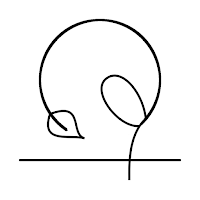Why gardens?
Gardens grow spontaneously, consume inputs, and produce yields. Even without intervention they grow, but given catalysts like attention and effort, they yield more. If, say, passive income is the pinnacle of owning, then gardens are the pinnacle of tending. With enough forethought, preparation, and attention, the recurring costs of tending a garden approach zero, because the elements naturally provide for each other. That's why gardens. Here are some gardens I'm learning about at Sage Garden Ecovillas.
The Plants Garden
This is the literal garden, with tangible plants in it. Actually, plants are just a mascot for this garden (but the word starts with a "p," and I'm doing a thing here with alliteration, so bear with me). We might as well include in this garden animals and all things that live, in the biological sense. This is the "densest" of the four gardens I'll talk about, if that metaphor makes sense. I guess what I mean by that is in this garden, the elements, the inputs, and the outputs are all tangible, physical things.
It's worth pointing out that humans, which appear as biological organisms in this garden, are not central in it. In this garden, we are just another element, and just as reliant on other elements as they are on each other. Put another way, this garden does not depend on us, but we depend on it.
The People Garden
 For this garden, "people" refers not to human bodies (they belong in the "plants" garden), but to entities with a will, a spirit, an ability to observe, desire, believe, choose. Growth in this garden refers not to physical growth, but to the self-development of things like authenticity, wisdom, personal power, freedom. What does it mean to tend the garden of people at Sage Garden? First it means tending to my own growth. Then it means giving space for others to do the same. The prevailing norms of the landlord-tenant relationship are shaped by the objective of financial accumulation, and standard agreements focus on restrictions. In contrast, this-or-better agreements focus on intent and cooperation, and encourage expansion of whats and hows in whatever directions serve the whys.
For this garden, "people" refers not to human bodies (they belong in the "plants" garden), but to entities with a will, a spirit, an ability to observe, desire, believe, choose. Growth in this garden refers not to physical growth, but to the self-development of things like authenticity, wisdom, personal power, freedom. What does it mean to tend the garden of people at Sage Garden? First it means tending to my own growth. Then it means giving space for others to do the same. The prevailing norms of the landlord-tenant relationship are shaped by the objective of financial accumulation, and standard agreements focus on restrictions. In contrast, this-or-better agreements focus on intent and cooperation, and encourage expansion of whats and hows in whatever directions serve the whys.In contrast to the plants garden above, humans have a pivotal role in the people garden. In fact, depending on your metaphysical beliefs (which I don't care to change), humans may be the only people who exist in this garden.
The Practices Garden
This is a garden of actions. Not hypothetical actions (which participate in the next garden below); but actions that are actually performed. Some practices are a prerequisite to other practices. Many practices yield knowledge. The "weeds" in this garden are practices that harm or destroy, or interfere with beneficial practices. In my opinion, of the four gardens, this one has the greatest room for growth at Sage Garden.
The Philosophies Garden
This is the garden of ideas, including knowledge, experience, ways of understanding, mental tools, methods of doing. If the plants garden is the densest, this idea garden is the most rarefied. This makes it no less effective, just less obvious, less strenuous. One demonstration of the rarefied nature of this garden is an observation by George Bernard Shaw: "If you have an apple and I have an apple and we exchange these apples then you and I will still each have one apple. But if you have an idea and I have an idea and we exchange these ideas, then each of us will have two ideas."
How the Four Gardens Relate to Each Other
There is a chain of dependency among the four gardens. The people garden depends on the plants garden. The practices garden depends on the people garden, and the philosophies garden depends on the practices garden.
Besides those hard dependencies, there are also softer, tending relationships that can either be beneficial or harmful. People and practices can tend the plants garden. Practices and philosophies can tend the people garden. And philosophies can also tend the practices garden.
Which brings us to one last garden I'd better mention.
No-garden
No-garden is a recognition of the limitation of the garden analogy. It's a frank admission that although this metaphor may be helpful, we'd be better off scrapping the whole thing than believing it's all there is. I think this garden unlocks the power of the others. Without this garden, the others are a pointless mental exercise at best.





You have provided a richly informative article about raised vegetable beds. It is a beneficial article for me and also helpful for those who are searching for this type of blog. Thanks for sharing this information here.
ReplyDeleteThank you for writiing this
ReplyDelete